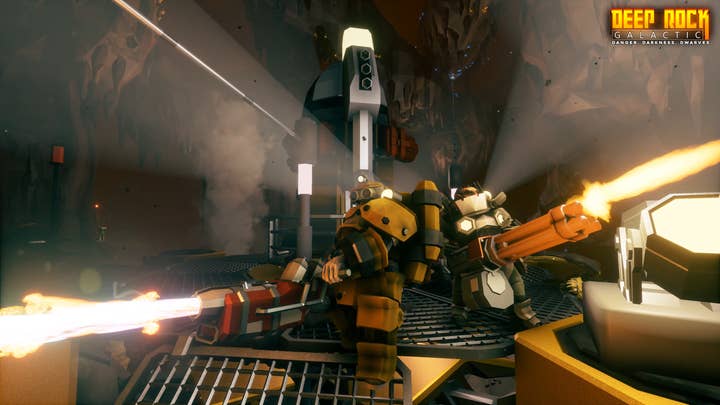Deep Rock Galactic and the advantages of open development
Game director and studio co-founder Mikkel Pedersen discusses how Ghost Ship Games has thrived in early access
From Godus to PlayerUnknown's Battlegrounds, Steam Early Access has been a minefield of inconsistency since Valve first announced it. Whether it's failed projects that never materialise or simple ideas that spin out to become billion dollar mega-hits, early access presents developers with a unique slate of challenges and opportunities.
It's not uncommon for the pressures of early access to mount up as each update is put under the microscope; the accountability of open development can present a terrifying obstacle as a studio wrestles with its need to continue building the game, against the demands of its community. Of course, it can also be the key to unlocking unforeseen potential and scope for a game by allowing a studio to cash-in early and expand internally.
Since arriving on Steam Early Access and Xbox Game Preview in February, Deep Rock Galactic has made over 300,000 sales, the development team has grown from six to 18, and a publisher, Coffee Stain Studios, has been brought on board to help take the pressure off.

For its developer, Copenhagen-based Ghost Ship Games, the open development of early access has been part of the team's design philosophy since day one. As game director and studio co-fonder Mikkel Pedersen told GamesIndustry.biz at Gamescom this year, taking the step to open up was the hard part; after that, the rest was easy.
"I've been in the games industry for 20 years and this is the first early access title I've done," he says. "To me it's been really, really great. One of the things that I've found really entertaining is the openness of the game. At the very early stage we allowed players to log on [and give feedback] about the design, our progression; there has been no secrecy, and that has been a big relief."
As Pedersen says, the games industry is traditionally "very hush hush", and it's unlike developers to share rough cut versions of their work so openly. But Pedersen finds early access and open development less stressful than the cloak and dagger secrecy of traditional development.
"The hardest part was opening up about the game for the first time, but the second we had opened up and started talking about the game, everything was improving"
"It's much more relaxed," he says. "Why would you be scared about talking about what you're doing? When we started Ghost Ship Games, we had a playable prototype after three months, maybe even earlier... and we just put it out on a closed alpha. Then we started building our community around that.
"The hardest part was opening up about the game for the first time, but the second we had opened up and started talking about the game, everything was improving. We started [with very little game], and every time we talked about it we had more preparation, we had made the game prettier, we had made more features; from then on it was a success for us being open about the game."
But more than that, Pedersen says that decision making becomes easier because developers are already communicating with the players, and thinking about how they react to the game.
"Because we are open about it, it brings us much closer to the end users and in that regard it peels off a lot of the bullshit, and makes what we're doing much more concrete," he says. "The users have these concrete problems and we can try to solve them.

"We have some features we want to do, and a lot of the reasons why this game is awesome to work on is because we have chosen a style where we can produce content really fast because we don't have very high detailed models or high detailed enemies, so we can pump it out really quick, and that's amazing. We want to have gameplay first, or we want to be able to create a lot of gameplay fast."
When considering early access, developers can be turned off the idea of responding to the needs of a potentially demanding community, or one that possibly even thinks it knows better than designers with decades of collective experience. However, according to Pedersen, this hasn't been the case, and is something which has only helped improve the game; the pressure to keep providing new content "is what makes our day tick".
"It's much more relaxed. Why would you be scared about talking about what you're doing?"
"We try to be really consistent about it and we get so much positive feedback about it, that's what really motivates us to continue doing that," he says. "One of the things that we haven't been doing before but are now, is coming out with a roadmap that will give our fans a better idea of what we are working on."
Up until recently, development was very much a moment to moment affair for Ghost Ship Games, moving from update to update. While this ad hoc approach works internally -- because "writing down stuff... has a tendency to outdate really fast" -- laying out plans is an important part of the studio's efforts to engage with the community.
"Overall, we get a lot of feedback and that is positive in itself I think," says Pedersen. "We try to look at it all basically... Part of what we have been focusing on is actually coming from the community. What are the targets? What are people really wanting to see in the game? A lot of the time, those are the same things we are working on. Sometimes they are not, but a lot of the times they are, so that's actually a very good thing."
Given the four-player co-operative nature of Deep Rock Galactic, it's something which the development team spends a lot of time playing collectively, but such an insular approach can result in less than obvious problems that only input from the community can highlight.
"When we launched the game, we were not handling how to kick players [from the game] very well and we got some negative feedback on that, and we fixed that, and that was something that was hard for us notice when we were just playing it ourselves," says Pedersen. "That was a very positive experience for us because we hadn't realised the problems of not handling it well. That was something we wanted to fix fast, and the game is better for it today."








